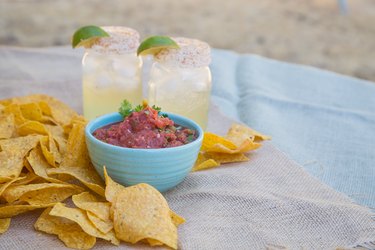
Bladder irritation can occur for a variety of reasons, including conditions such as overactive bladder, interstitial cystitis and bladder stones.
Certain foods and chemicals can potentially aggravate bladder irritation, provoking symptoms such as the need to urinate more frequently, difficulty holding your urine and/or pain when you empty your bladder.
Video of the Day
Video of the Day
Foods and dietary chemicals that irritate the bladder vary from person to person, so you might need to experiment to find those that bother you. See your doctor if you experience bladder irritation to determine the cause and best treatment options.
Caffeine
Caffeine is a common bladder irritant. Coffee, tea, soda and energy drinks are among the top dietary sources of caffeine. Some over-the-counter pain relievers — especially those marketed for headache relief — also frequently contain significant amounts of caffeine.
Caffeine is thought to irritate the bladder by increasing the amount of urine you produce and possibly increasing the excitability of the muscle tissue in your bladder wall, as noted in a February 2013 International Urogynecology Journal study report. If you are particularly sensitive to caffeine, you might want to limit the amount of chocolate in your diet as it also contains caffeine.
Carbonated Beverages
Carbonated beverages, including sodas and sparkling water, can potentially irritate your bladder and contribute to related symptoms. A study reported in the July 2003 issue of BJU International involving among more than 6,400 women found that drinking carbonated beverages was associated with an increased risk of overactive bladder and stress incontinence — urinating a bit when you sneeze, cough, laugh or strain.
It isn't clear why carbonated drinks might irritate your bladder but researchers speculate that sugar, caffeine, and artifical sweeteners, colorants or preservatives in these beverages might be possible culprits, as noted in a June 2013 American Journal of Epidemiology article.
Alcoholic Beverages
Alcoholic beverages, including beer, wine and hard liquor, exert a diurectic effect on your kidneys — meaning they cause you to produce more urine. This effect can aggravate symptoms associated with bladder irritation.
While drinking small amounts of alcohol might not cause problems for you, an analysis of studies evaluating the effect of drinking on bladder-related symptoms found that heavy drinking increased the risk for these symptoms, as reported in a November 2017 Journal of Urology article.
Certain Fruits and Juices
Certains fruits and juices might provoke bladder irritation symptoms. Cranberries and cranberry juice can potentially irritate your bladder, possibly by making your urine more acidic. Citrus fruits and their juices have also been reported to trigger bladder irritation symptoms in some people.
It remains unclear why citrus fruits might cause bladder irritation, although a June 2012 BJU International review article states it is unlikely to be due to urine acidity. Other fruits that might provoke bladder irritation in some people include papayas, cantaloupe, grapes, nectarines, kiwi fruit, pineapples, strawberries and passion fruit.
Certain Vegetables
Most vegetables are considered bladder friendly but some might be irritating in certain people. According to the Interstitial Cystitis Association, likely potential offenders include hot peppers, raw onions, horseradish, pickles, edamame, roasted soy beans and sauerkraut.
Tomatoes and tomato products, such as sauces and tomato-based soups, can also potentially trigger bladder irritation symptoms. As with fruits, it remains unclear why some vegetables prove irritating while others do not.
Spicy Foods and Condiments
Some people with bladder irritation find spicy food aggravates their symptoms. This is particularly true for foods that contain hot spices, including cayenne and red pepper, chili powder, hot curry powder, cloves and/or paprika.
You might also want to avoid certain condiments and ingredients, particularly soy sauce, tamari sauce, vinegar, ketchup, mustard, Worcestershire sauce, meat tenderizer and monosodium glutamate (MSG).
MSG is a flavor enhancer found in a variety of packaged and processed foods, such as canned soups, salad dressings and some snack foods. MSG might also be used in restaurant meals and prepared foods from the grocery store.
Other Foods and Chemicals
Foods that contain artificial sweeteners and sugar substitutes, including aspartame, acesulfame K, saccharin and stevia, can potentially provoke bladder irritation symptoms. These sweeteners are found in a wide array of foods, such as diet beverages, light yogurt and reduced-calorie frozen desserts.
Other foods identified by the Interstitial Cystitis Association to avoid because of their potential to worsen bladder irritation include:
- Boxed pasta or rice meal mixes
- Cured meats, such as salami and pepperoni
- Sausage, hot dogs and smoked fish
- Processed cheese products
- Bouillon cubes and powders, and dry soup and dip mixes
- International Urogynecology Journal: Caffeine and Urinary Incontinence in US Women
- BJU International: The Association of Diet and Other Lifestyle Factors With Overactive Bladder and Stress Incontinence: A Longitudinal Study in Women
- American Journal of Epidemiology: Intake of Caffeinated, Carbonated, or Citrus Beverage Types and Development of Lower Urinary Tract Symptoms in Men and Women
- Journal of Urology: Evidence of the Impact of Diet, Fluid Intake, Caffeine, Alcohol and Tobacco on Lower Urinary Tract Symptoms: A Systematic Review
- BJU International: Diet and Its Role in Interstitial Cystitis/ Bladder Pain Syndrome (IC/BPS) and Comorbid Conditions
- Interstitial Cystitis Association: IC/PBS Food List